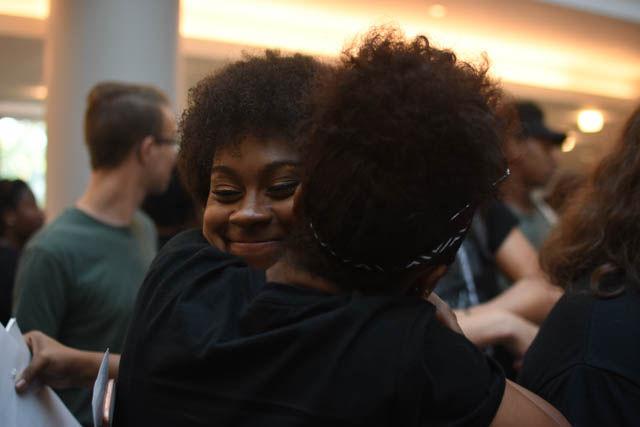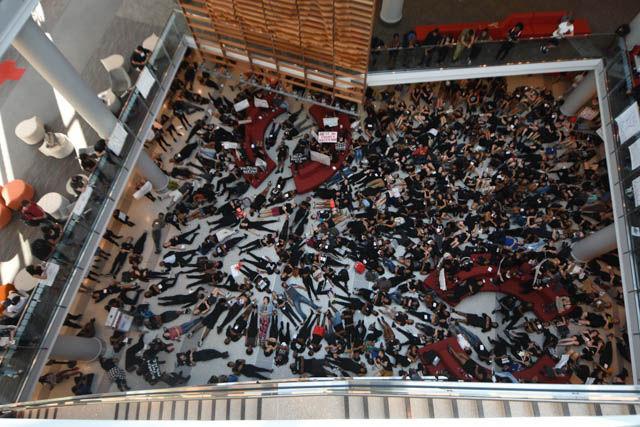Nearly 300 black NC State students and allies, dressed in all black, gathered in Wolf Plaza Friday for a “blackout” and a “die-in” on the NC State seal inside of Talley Student Union to protest the killing of black individuals at the hands of police.These protests follow the death of Keith Scott, who was fatally shot by a police officer in Charlotte.
“I and so many others have organized this blackout to bring awareness to and acknowledge that we are in disapproval of the injustice and violence due to police brutality that we have been frequently seeing the past few months,” said Achaia Dent, a key organizer of the event, a member of Student Government and the Society of Afrikan American Culture and a sophomore studying animal science.
Dent sported a black T-shirt with the words “Melanin Poppin” and encouraged black students to embrace the intersections in their identities while standing up against the injustice ensued by police.
“Being black to me is beautiful, and I wouldn’t trade my melanin for a thing,” she said. “There are so many upsides, the culture, the community, the support, as you can see. But there’s another side to being black. There’s a beat-down, tired in every body.”
Dent, along with other organizers, expressed the exhausting hurt they have felt over these past couple of months.
“Why am I tired? Empty? Beat down?” She asked. “I have seen so many bodies that look like mine fall to the hands of police. I have seen people that resemble my 10-year-old brother or my uncles, my dad, my aunts, get gunned down on cellphone videos, dashcams and Facebook Live. How dare people carry on with their day like there is nothing wrong in the world, our country and our state?”
In addition to addressing police brutality, Dent confronted institutionalized racism at NC State.
“The university doesn’t care, they don’t value our black bodies, ideas, they don’t acknowledge our hurts, anger or even fear,” Dent said. “Even the ones involving our own campus. Our classes aren’t conducive to all types of learning or inviting for all audiences because they are color-blind. And it seems to think that have one diversity conversation for 50 minutes per semester is more than enough.”
According to Forbes, only 6.6 percent of students at NC State are black or African-American, compared to 13.3 percent of the United States as a whole and 22.1 percent of North Carolina, according to the U.S. Census Bureau.
“Are we just not letting in as many minorities?” said Brittany Cody, a junior studying political science. “Are we just closing that door of opportunity for them … When white is the default, I think that’s privilege at its highest.”
Dent also expressed her discontent with the lack of administration present at the protest.
“They told our faculty, staff and student workers that they strongly discouraged that they should not even participate in this very rally because it breaks code,” she said. “Because having an opinion can literally end your career at this university.”
Other students shared Dent’s frustration with the lack of administrative presence but were grateful for the support even from afar.
“They were told by higher-ups that they are not allowed to participate in our rally today,” said Danita Gibbs, a protester and a senior studying criminology. “However, they’re allowed to be present just as long as they’re not seen. It is sad in itself, but we do appreciate their support regardless of their position.”
Student Body Vice President Brayndon Stafford shared with students how to help make change on NC State’s campus and in the state by being politically active.
“Change cannot be made by just one person,” said Stafford, a senior studying environmental sciences. “We have to vote.”
Stafford said progressive voices must not come from the minority vote alone, but also from the votes of millennials.
“We have the voice to make the change in our area,” Stafford said. “There are no excuses.”
The concluding remarks were given by Cidni Ford, the co-president of the Society for Afrikan American Culture and a senior studying psychology.
“I’m sad, I’m upset and I’m angry,” Ford said. “We have to find each other on this campus. Finding black people to identify with on this campus is like playing ‘I Spy,’ ‘Where’s Waldo,’ what have you.”
Ford proclaimed that the problem was not strictly limited to one race but to all Americans.
“The issue here is not a black problem, it is not a white problem, it is an American sickness,” Ford said. “People don’t understand Black Lives Matter, and they are quick to dismiss it.”
Ford went on to express her frustration with how black people have been told to handle their oppression.
“It’s easy for people who aren’t oppressed to tell you how to handle it,” Ford said. “We’ve been free for 154 years. Has there ever been a time when the white community had to calculate how long they’ve been able to have the right to be a human?”
As the rally at Wolf Plaza came to an end, protesters began to sing “Lift Ev’ry Voice and Sing,” while walking into Talley for the “die-in” portion of the event. Some students carried signs marked with the words “Stop Killing Us,” “Hold Cops Accountable,” “Legalize Melanin,” “Does This Make You Uncomfortable? Welcome To My Life,” and others on the way into Talley.
Once inside, students without signs lay on the floor for about 10 minutes to represent the lives lost at the hands of police, while those with signs stood in complete silence.
“This isn’t even a fraction of the bodies that have been killed by police,” said Timira Conley, a junior studying foreign language and political science and the director of diversity outreach for Student Government.
Onlookers seemed unsure of how to react to the protest, with some choosing to walk around the students participating.
“How dare you say ‘just walk around us’?” Ford said. “History has always been walking around us.”
Toward the end of the die-in, Dent brought forward her 10-year-old brother, Xavier Dent, as an example of the young lives that have been lost at the hands of those sworn to “serve and protect.”
“He is 10; Tamir was 12,” Dent said. “He’s an outstanding student. He’s so bright. He might not look like you, but you should care.”
There were only a handful of non-black students protesting at the event, but those who were there, like Cody, expressed commitment to standing in solidarity with fellow black students.
“I don’t get how they can just ignore this,” Cody said.
All of the organizers spoke words of camaraderie for the black community and its allies. Stafford encouraged all allies to continue to support black students on campus.
“We have to continue to come together after today,” Stafford said. “There is hope.”
Students filled the floor of Talley Student Union on Sept. 23 for the NC State Blackout in protest of recent events happening in Charlotte and other police brutality across the nation. By creating a peaceful protest, the movement was able to communicate the importance of not being able to just step over the bodies of those who lost their lives due to injustice or prejudice.









